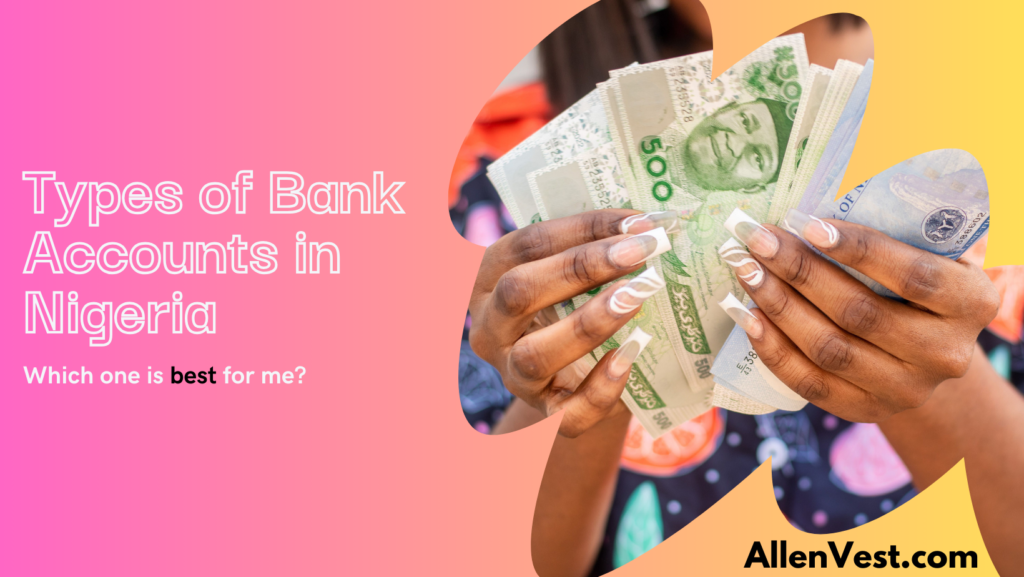
Are you confused about the best bank account type for your financial needs in Nigeria? With so many options available, it’s hard to pick one. But don’t worry, we’ve got you covered. In this article, we will guide you through the process of choosing the best bank account type that suits your specific requirements. We know that everyone’s needs are different, so we’ll consider factors such as interest rates, fees, accessibility, and customer service to help you select the best bank account type.
You will learn:
- What a bank account is and how it works
- Types of bank accounts of customers in Nigeria
- Factors to consider when choosing a bank account type in Nigeria
- Factors to consider when choosing a bank in Nigeria
- Which bank account type is best in Nigeria?
- Frequently asked questions on the best bank accounts in Nigeria
What is a Bank Account, and How Does It Work?
A bank account is a financial account between a bank customer and a financial institution. A Bank account may have a positive (credit) balance where the bank owes money to the customer. They can also have a negative/debit balance where the customer owes the bank money.
Bank accounts are used to safely store money, conduct financial transactions, and access various banking services. They provide a secure place for individuals and businesses to keep their funds, allowing for easy deposits, withdrawals, and transfers. Bank accounts come with unique account numbers and can be accessed through different channels such as ATMs, online banking, mobile banking, and bank branches.
Types of Bank Accounts of Customers in Nigeria
- Savings account
- Basic chequing account
- Interest-bearing checking account
- Time deposit account
- Lean account
- Joint account
- Corporate account
- Domiciliary account
- Diaspora account
1. Savings Account
This is usually the first step for new account holders.
A savings account is a basic bank account that allows you to deposit money, keep it safe, and withdraw funds when needed. You earn interest on the money you keep in the account, which helps your savings grow over time.
In Nigeria, savings accounts are popular due to their simplicity and ease of access. They usually come with minimal fees and are perfect for individuals looking to save money regularly.
Many banks offer online and mobile banking services for savings accounts, making it convenient to manage your finances.
2. Basic Chequing Account (Current Account)
A basic chequing account, also known as a current account, is used for daily transactions. It allows you to deposit and withdraw money frequently without limits. You can use this account to write cheques, pay bills, and make purchases.
These accounts usually do not earn interest but provide easy access to your funds. In Nigeria, basic chequing accounts are essential for individuals and businesses that need to handle frequent transactions.
This type of account often comes with a chequebook and a debit card for convenient access to your money. Among the various bank account types in Nigeria, a basic chequing account is best for frequent financial transactions.
3. Interest-Bearing Checking Account
An interest-bearing current account is similar to a current account but with the added benefit of earning interest on your balance. This type of account offers the convenience of a checking account along with the opportunity to earn some interest, though usually at a lower rate compared to savings accounts.
In Nigeria, interest-bearing checking accounts are suitable for individuals who want to maintain liquidity while earning a modest return on their deposits.
4. Time Deposit Account (Fixed Deposit)
A time deposit account, often called a fixed deposit account, requires you to keep your money in the account for a specific period, such as six months, one year, or more. The minimum in most Nigerian banks is one month.
In return, you earn a higher interest rate compared to regular savings accounts. However, you cannot withdraw the money before the end of the term without facing penalties.
If you want to save a large amount of money and earn a higher return without the need for immediate access, this bank account type is the best in Nigeria for such purposes.
Continue Reading (opens in new tab)
Fixed Deposit Accounts in Nigeria – Beginner’s Guide
5. Lean Account
A lean account, often referred to as a basic savings account, is designed for individuals who need a simple and easy-to-manage account with minimal fees.
These accounts offer lower interest rates and are ideal for those with straightforward banking needs. Among the different bank account types in Nigeria, lean accounts are perfect for those prioritizing simplicity and cost-efficiency.
6. Joint Account
A joint account is an account shared by two or more individuals. It allows all account holders to deposit, withdraw, and manage the funds. Joint accounts are useful for couples, business partners, or family members who want to manage their finances together.
There are two main types of joint accounts:
Joint Tenancy Account
In a joint tenancy account, all account holders have equal access and rights to the funds. If one account holder passes away, the remaining funds automatically transfer to the surviving account holders.
This type of account is commonly chosen among bank account types in Nigeria for its straightforward inheritance benefits.
Tenants-in-Common Account
In a tenants-in-common account, each account holder owns a specific share of the account. If one account holder dies, their share of the funds is passed on to their designated beneficiaries rather than the surviving account holders.
This structure allows for more flexible estate planning, making it a unique option within the bank account types in Nigeria.
7. Corporate Account
A corporate bank account is a specialized bank account for businesses and organizations. It facilitates the management of business finances, including deposits, withdrawals, payroll, and various other transactions.
Corporate accounts also provide additional features such as multiple-user access, dedicated relationship managers, and tailored banking solutions.
In Nigeria, corporate accounts are essential for businesses that handle high transaction volumes. These accounts usually require more documentation compared to personal accounts, such as incorporation documents and board resolutions.
When viewing bank account types in Nigeria, corporate accounts are best for businesses aiming to manage their operations efficiently.
8. Domiciliary Account
A domiciliary account allows you to hold and transact in foreign currencies, such as US dollars, euros, or British pounds. This type of account is particularly beneficial for individuals and businesses involved in international transactions.
You can receive foreign currency payments, make international transfers, and save in a foreign currency. In Nigeria, domiciliary accounts are popular among exporters, importers, and individuals who receive remittances from abroad.
9. Non-Resident Nigerian/Diaspora Account
A non-resident Nigerian (NRN) or diaspora account is designed for Nigerians living abroad who wish to maintain a bank account in Nigeria. They can manage their finances back home, including saving, sending money to family members, and investing in Nigeria.
NRN accounts can be denominated in either naira or foreign currencies. Opening a non-resident Nigerian account usually requires proof of residence abroad and other identification documents.
Factors to Consider When Choosing a Bank Account Type in Nigeria
Choosing the right type of bank account is very important to manage your finances effectively. By carefully considering these practical and realistic factors, you can select the best bank account type in Nigeria that aligns with your financial goals and lifestyle.
1. Purpose of the Account
- Daily Transactions vs. Savings: Determine whether you need the account for everyday transactions or for saving money. For daily use, a chequing (current) account is ideal, while a savings or fixed deposit account is better for accumulating interest on your savings.
- Personal vs. Business Use: If the account is for business purposes, a corporate account is necessary. Personal accounts are designed for individual financial management.
- Joint Accounts: If you are managing finances with a partner or family member, a joint account might be the best option.
- Domiciliary Accounts: If you need to handle foreign currencies, consider domiciliary accounts, which allow you to hold and transact in different currencies with favorable exchange rates.
2. Interest Rates
- Savings and Fixed Deposits: Check the interest rates offered by different accounts. Savings accounts and fixed deposit accounts typically offer interest on the balance, which can help your money grow.
- Chequing Accounts: These accounts may offer little to no interest, but they provide easy access to your funds for daily use.
3. Fees and Charges
- Maintenance Fees: Some accounts come with monthly or annual fees. Compare these fees to find an account that fits your budget.
- Transaction Fees: Look at the cost of transactions, such as withdrawals, transfers, and payments. High transaction fees can add up if you use your account frequently.
- Overdraft Fees: If there is a possibility you might overdraw your account, consider the overdraft fees associated with each account type.
4. Minimum Balance Requirements
- Opening Balance: Different accounts require different amounts to open. Make sure you can meet the minimum opening balance.
- Maintaining Balance: Some accounts require you to maintain a certain balance to avoid fees. Ensure you can comfortably keep this balance in the account.
5. Flexibility and Terms
- Withdrawal and Deposit Limits: Understand any limits on withdrawals and deposits. Some accounts have restrictions that might not fit your needs.
Also Read (opens in new tab)
Best Binance Alternatives in Nigeria for P2P – OKX and Bybit
Factors to Consider When Choosing a Bank in Nigeria
Choosing the right bank is essential for managing your finances effectively. Here are the most important factors to consider:
1. Reputation and Stability
Choose a bank with a solid reputation and a history of financial stability. Look for banks that are well-established and trusted by customers.
2. Accessibility
Consider the bank’s branch and ATM network. Choose a bank with convenient locations for easy access to your money.
3. Online and Mobile Banking
Check the bank’s online and mobile banking services. Make sure they offer user-friendly platforms with features like bill payments, fund transfers, and account monitoring.
4. Customer Service
Look for a bank that provides excellent customer service. Consider factors such as responsiveness, helpfulness, and availability of support channels like phone, email, and live chat.
5. Fees and Charges
Compare the fees and charges associated with different banks. Consider factors such as account maintenance fees, transaction fees, and ATM fees to minimize your banking costs.
6. Interest Rates
Check the interest rates offered by the bank on savings accounts, fixed deposits, and other products. Choose a bank that offers competitive rates to help your money grow.
7. Security
Ensure the bank has robust security measures in place to protect your personal and financial information. Look for features like encryption, multi-factor authentication, and fraud monitoring.
8. Financial Products and Services
Consider the range of financial products and services offered by the bank. Look for features like loans, mortgages, investment options, and insurance products to meet your financial needs.
9. Reviews and Recommendations
Research online reviews and ask friends, family, or financial advisors for recommendations. Hearing about other customers’ experiences can help you make an informed decision.
Which Bank Account Type is Best in Nigeria?
Choosing the right bank account type depends on your individual needs and financial goals. Here’s a guide to help you determine which account type is best for you:
1. If you are looking to save money for short-term goals or emergencies, then a savings account will be best for you. It offers easy access to your funds while earning some interest on your balance.
2. If you are someone who needs frequent access to your funds for everyday transactions, then a current account will be best for you. It is suitable for professionals, business owners, and individuals with regular income streams who require features like check-writing, debit cards, and overdraft protection.
3. If you are looking to earn higher interest rates on your savings over a fixed period without needing immediate access to your money, then a fixed deposit account will be best for you. This is ideal for those with surplus funds aiming for a low-risk investment option.
4. If you are looking to manage finances together with a partner, family member, or business associate, then a joint account will be best for you. It’s great for sharing expenses, paying bills, and achieving common financial goals with transparency and trust.
5. If you are a business owner or managing an organization, then a corporate account will be best for you. This account type is tailored to handle business finances, process payments, and access business loans, suitable for businesses of all sizes.
6. If you are involved in international transactions or need to receive foreign currency payments, then a domiciliary account will be best for you. It’s ideal for travelers, expatriates, freelancers, and businesses dealing with import-export activities.
7. If you are a Nigerian living abroad who wants to maintain financial ties to Nigeria, then a non-resident Nigerian/diaspora account will be best for you. This account is suitable for receiving remittances, investing in Nigerian assets, and accessing banking services from overseas.
Frequently Asked Questions on the Best Bank Accounts in Nigeria
1. How many banks do we have in Nigeria?
As of May 2024, Nigeria has 26 commercial banks. These include:
- Access Bank Plc
- Citibank Nigeria Limited
- Ecobank Nigeria Plc
- Fidelity Bank Plc
- First Bank Nigeria Limited
- First City Monument Bank Plc
- Globus Bank Limited
- Guaranty Trust Bank Plc
- Heritage Banking Company Ltd.
- Keystone Bank Limited
- Optimus Bank
- Parallex Bank Ltd
- Polaris Bank Plc
- Premium Trust Bank
- Providus Bank
- Signature Bank Limited
- Stanbic IBTC Bank Plc
- Standard Chartered Bank Nigeria Ltd.
- Sterling Bank Plc
- SunTrust Bank Nigeria Limited
- Titan Trust Bank Ltd
- Union Bank of Nigeria Plc
- United Bank For Africa Plc
- Unity Bank Plc
- Wema Bank Plc
- Zenith Bank Plc
2. How many bank accounts do we have in Nigeria?
Several types of bank accounts are available in Nigeria, including savings accounts, current accounts, fixed deposit accounts, joint accounts, corporate accounts, domiciliary accounts, and non-resident Nigerian/diaspora accounts.
3. What are the types of banking in Nigeria?
In Nigeria, the banking sector comprises commercial banks, microfinance banks, merchant banks, and development banks. These banks provide various financial services to individuals, businesses, and government entities.
6. What are the six types of bank accounts?
The six main and most common types of bank accounts in Nigeria are:
- Savings Account
- Current Account
- Fixed Deposit Account
- Joint Account
- Corporate Account
- Domiciliary Account
7. What’s the difference between a savings account and a current account?
A savings account is designed for individuals to save money and earn interest on their deposits. It usually has withdrawal limits and fewer transaction capabilities. On the other hand, a current account is meant for frequent transactions and is commonly used by businesses and professionals. It offers features like check-writing, unlimited withdrawals, and overdraft facilities but usually does not pay interest.
8. What are the requirements to open a bank account in Nigeria?
The basic requirements to open a bank account in Nigeria include:
- A completed account opening form
- A valid means of identification (e.g., national ID card, international passport, driver’s license)
- Proof of address (e.g., utility bill, tenancy agreement)
- Two passport-sized photographs
- Bank Verification Number (BVN)
9. Documents needed to open a bank account in Nigeria
The documents needed to open a bank account in Nigeria include:
- A completed account opening form
- A valid means of identification (e.g., national ID card, international passport, driver’s license)
- Proof of address (e.g., utility bill, tenancy agreement)
- Two passport-sized photographs
- Bank Verification Number (BVN)
- For corporate accounts, additional documents such as a Certificate of Incorporation, Memorandum and Articles of Association, and a board resolution authorizing the account opening are required.
Our telegram group is now open to the public. Get instant access to the latest blog posts, updates, exclusive content, and valuable insights on banking, investing, and financial planning. Stay connected with us for a brighter financial future.


Pingback: Paystack vs Flutterwave Review in Africa: Which is Better? - AllenVest.com